#treaty of union
Text
It would really be interesting to see a list of all the times Westminster has broken the terms of the Treaty of Union.
#scottish independence#scottish politics#uk politics#international treaties#international law#scots law#so called union of equals#treaty of union
152 notes
·
View notes
Link
The parties in the conflict in Ethiopia’s northern region of Tigray agreed on a “permanent cessation of hostilities,” the African Union mediator said, [in November 2022,] just more than a week after formal peace talks began in South Africa.
Former Nigerian President Olusegun Obasanjo, in the first briefing on the peace talks on Wednesday, said Ethiopia’s government and Tigrayan authorities have agreed on “orderly, smooth and coordinated disarmament” along with “restoration of law and order,” “restoration of services” and “unhindered access to humanitarian supplies.”
The agreement marked a new “dawn” for Ethiopia, he said, speaking at a news conference.
The war, which broke out in November 2020, has pitted regional forces from Tigray against Ethiopia’s federal army and its allies, which include forces from other regions and from neighbouring Eritrea.
Ethiopian Prime Minister Abiy Ahmed hailed Wednesday’s breakthrough deal and committed to working towards the agreement.
“The commitment to peace remains steadfast. And our commitment to collaborating for the implementation of the agreement is equally strong,” he said in a statement.
Tigray’s rebels hailed the deal and said they had made concessions.
“We are ready to implement and expedite this agreement,” said the head of their delegation, Getachew Reda.
“In order to address the pains of our people, we have made concessions because we have to build trust.
“Ultimately, the fact that we have reached a point where we have now signed an agreement speaks volumes about the readiness on the part of the two sides to lay the past behind them to chart a new path of peace,” said Reda.”
-via Al Jazeera, 11/2/22
Update: 1/25/23
Nearly three months after it was signed, the tentative peace deal between the Ethiopian government and leaders of the country’s northern Tigray region appears to be holding. Tigrayan forces have begun to disarm, basic services such as banking and telecommunications are being restored, and desperately needed humanitarian relief is making its way to Tigrayan civilians.
Although thorny questions remain about the presence of Eritrean forces in Ethiopia, the status of contested territory, and accountability for the severe human rights abuses that characterized the two-year conflict, the momentum is toward a reduction in violence.
-via Foreign Affairs, 1/25/23
#ethiopia#tigray people#tigrayan#civil war#cw war#cw starvation#cw genocide#global politics#peace treaty#africa#african union#good news#hope
58 notes
·
View notes
Text
it does make me laugh seeing film bros (gn) get their feathers ruffled over literally any part of goncharov because like
for all that people are complaining that it doesn't make sense as a scorsese work, as a product of the given time frame, as a cohesive piece of [fake] media, no one involved in any of this understands how organized crime itself works, MUCH LESS the specific flavors involved in cross-ethnic organized crime a la a russian gangster in naples would work in the first place
but you don't see me with my masters degree in inter-ethnic cooperation in organized crime tearing that shit apart, because i know how to have fun
#there WERE no russian organized crime groups operating internationally before the 70s! it wasn't a thing!#the bratva didn't gain a foothold internationally until immigration laws in the soviet union let certain groups emigrate#the historical context plus deniro playing the titular character basically guarantees goncharov is jewish by the by#you guys don't even know about the jewish-italian hollywood cross-representation treaty of 1967#goncharov
75 notes
·
View notes
Text
Highlights from my EU4 Austria game up to 1600s


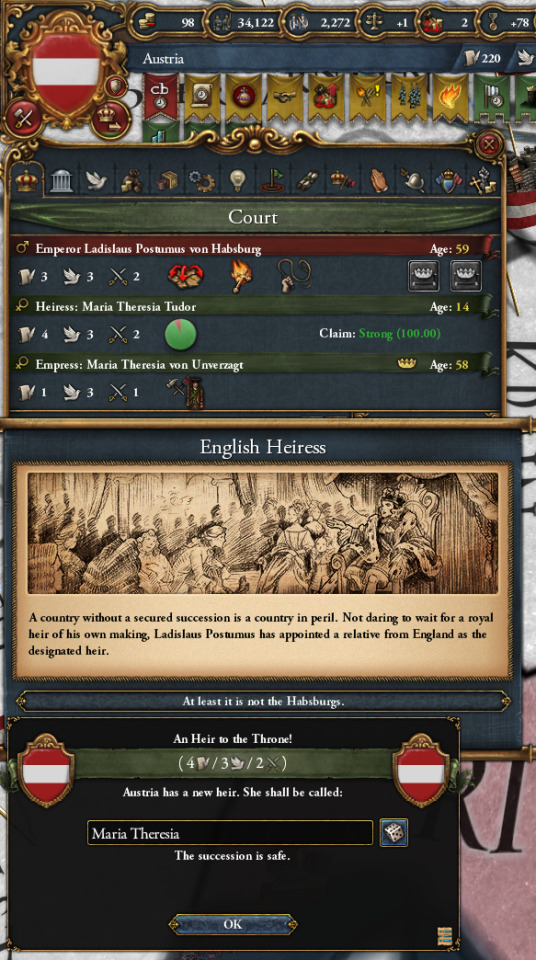
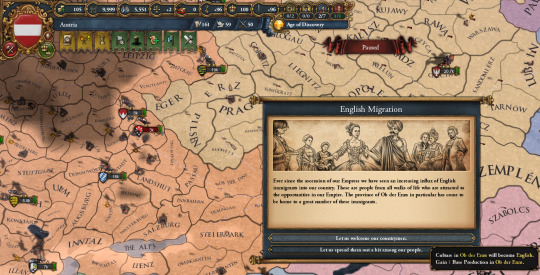
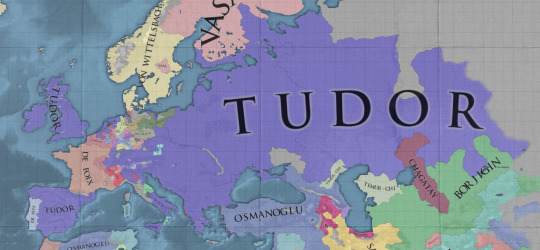


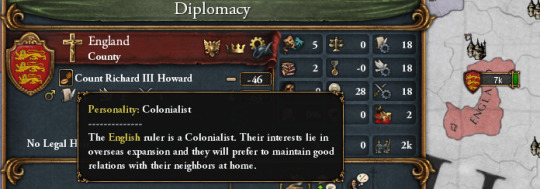

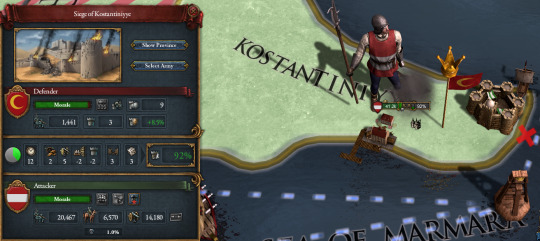

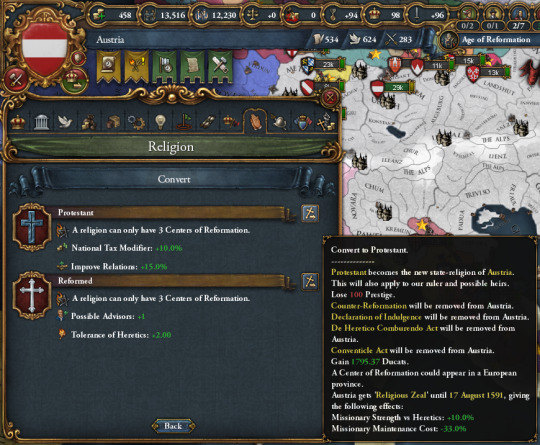

#og post#eu4#pdx games#not in order but still funny#Had the worst RNG I didn't get any Personal Unions peacefully and had to fight wars to get Milan & Hungary & Bohemia & Brandenburg as PUs#Burgundy fully evaded my grasp and all of this got me so hated I got excommunicated and lost the election to Fucking Pfalz#I'm calling them the German name cuz it's more cringe then The Palatenate#(3 of the 7 electors are literally Theocracies what do you expect. Excommunication and the religious league wars were the end of me)#I got so pissed I switched to the Protestant side of the 30 year war and curbstomped Pfalz but only to sign the Treaty of Westphalia#Allowing me to gitch out and become an Easter Orthodox Christian member of the HRE (since it's peace between ALL Christians after all)#I can't even begin to explain how funny this is. Everyone picked sides based on me being Catholic!#When I switched sides all my allies were my enemies and all my enemies were my allies now.#Everyone lined up to kick my ass and I joined the queue. Then we beat up on some kid instead of me#Anyhow I also married into England without an heir and just... Got a Tudor as heir. The game pesters me to bring back the Habsburgs but no#It's better this way cause then I can try to take control over all the other Tudors (they hate me so that'd be hard)#England rebelled during my orthodox rebellion and so became an independent state seperate from Britian. Those are now two distrinct entitie#There's a England and there's a UK but they're nowhere near each other#And England wants to colonize overseas despit being landlocked. Like... No. Go back to paying me taxes!
18 notes
·
View notes
Text

It has now been 75 years since the creation of NATO. This organization was formed to protect our allies from the dangers of the Soviet Union. Although the Soviet Union is gone, NATO shall live strong. We will never abandon our allies. Long live NATO
#NATO#we are nato#long live nato#north atlantic treaty organization#1 nato 75 years#nato 75th anniversary#fuck communism#fuck the soviet union
2 notes
·
View notes
Text
One of the reasons why I love Putin is because he is amazing at pointing out other people's/nation's hypocrisy. Not that Putin is perfect. It is that if you want to set an example for people and other nations, then act the way you claim to be.
My keyboard isn't letting the translate function for some reason. I like having it in the Russian language for fellow Russians.
Credit goes to The Putin Perspective on tiktok
#westernhypocrisy #fucknato #fucktheusagovernment #fuckfrance #fuckgermany #fucktheuk #vladimirputin #vladimirvladimirovichputin #putin #emmanuelmacron #joebiden #barackobama #georgewbush #donaldtrump #billclinton #russia
#vladimir vladimirovich putin#volodymyr zelensky#emmanuel macron#united sanctions of america#united states of america#united kingdom#north atlantic treaty organization#north atlantic terrorist organization#nato#russia#european union#canada#australia#japan#politics
8 notes
·
View notes
Text
Putin, czar with no empire, needs military victory for his own survival
BY ROBYN DIXON AND CATHERINE BELTON
President Vladimir Putin likes to portray himself as a new czar like Peter the Great or Ivan III, the 15th-century grand prince known as the “gatherer of the Russian lands.” But Putin’s year-long war in Ukraine has failed so far to secure the lands he aims to seize, and in Russia, there is fear that he is leading his nation into a dark period of strife and stagnation — or worse.
Some in the elite also say the Russian leader now desperately needs a military victory to ensure his own survival. “In Russia, loyalty does not exist,” one Russian billionaire said.
Putin’s full-scale invasion of Ukraine began with hubris and a zeal to reshape the world order. But even as he suffered repeated military defeats — diminishing his stature globally and staining him with allegations of atrocities being committed by his troops — Putin has tightened his authoritarian grip at home, using the war to destroy any opposition and to engineer a closed, paranoid society hostile to liberals, hipsters, LGBTQ people, and, especially, Western-style freedom and democracy.
The Russian president’s squadrons of cheerleaders swear he “simply cannot lose” in Ukraine, thanks to Russia’s vast energy, wealth, nuclear weapons and sheer number of soldiers it can throw onto the battlefield. These supporters see Putin rising supreme from Ukraine’s ashes to lead a swaggering nation defined by its repudiation of the West — a bigger, more powerful version of Iran.
But business executives and state officials say Putin’s own position at the top could prove precarious as doubts over his tactics grow among the elite. For many of them, Putin’s gambit has unwound 30 years of progress made since the collapse of the Soviet Union. Putin’s vision of Russia horrifies many oligarchs and state officials, who confide that the war has been a catastrophic error that has failed in every goal. But they remain paralyzed, fearful and publicly silent.
“Among the elite, though they understand it was a mistake, they still fear to do anything themselves,” said the only Russian diplomat to publicly quit office over the war, Boris Bondarev, formerly brd at Russia’s U.N. mission in Geneva. “Because they have gotten used to Putin deciding everything.”
Some are sure that Putin can maintain his hold on power without a victory, as long as he keeps the war going and wears down Western resolve and weapons supplies. For anyone in the elite to act, Bondarev said, “there needs to be an understanding that Putin is leading the country to total collapse. While Putin is still bombing and attacking, people think the situation is not so bad. There needs to be a full military loss, and only then will people understand they need to do something.”
What all camps seem to agree on is that Putin shows no willingness to give up. As Russia’s battlefield position deteriorated in recent months, he escalated repeatedly, shuffling his commanders, unleashing brutal airstrikes on civilian infrastructure and threatening to use nuclear weapons.
Now, with his troops reinforced by conscripts and convicts and poised to launch new offensives, the 70-year-old Russian leader needs a win to maintain his own credibility. “Putin needs some success to demonstrate to society that he is still very successful,” a senior Ukrainian security official said, speaking on the condition of anonymity to discuss politically sensitive issues.
MOSCOW’S GLITTERING INDIFFERENCE
As the casualties mount in Ukraine, filling graveyards across Russia’s provinces, Moscow’s glittering facade conveys a hedonistic, indifferent city. Its restaurants and cafes are crammed with glamorous young patrons sporting European designer wear, taking selfies on the latest iPhones, and ordering truffle pizza or duck confit to be washed down with trendy cocktails.
But beneath, Putin is creating a militarized, nationalistic society, fed on propaganda and obsessed with an “existential” forever war against the United States and NATO. So far, no one in officialdom has had the nerve to object — not publicly, at least.
“Whatever he says, it’s taken like this,” the editor in chief of Nezavisimaya Gazeta, Konstantin Remchukov, said with a loud snap of his fingers.
RUSSIANS ABANDON WARTIME RUSSIA IN HISTORIC EXODUS
Since Putin rose to the presidency in 2000, his legitimacy has been brd on his popularity and stature among the elite, buttressed by his ability to instill fear by stripping some of their assets and throwing others into prison. The defeats in Ukraine have dented him.
The president seems forever haunted by the moment when as a young KGB officer serving in Dresden, the Soviet Union “gave up its position in Europe” as the Berlin Wall collapsed. And his pursuit of the empire lost with the subsequent Soviet collapse is throwing his country back into a gray, repressive and isolated past. For Putin, his efforts are a quest to right what he has perceived as historical wrongs. In his near-maniacal revisionist view, Ukraine has always belonged to Russia.
But even if Putin somehow forces Ukraine into capitulating and ceding occupied territory, those in the elite who lean toward a more liberal society stand to lose the most. Punitive Western economic sanctions are likely to remain in place, and some oligarchs undoubtedly would be pressed to pay to rebuild Russia’s new lands. Some analysts predict a sweeping purge of oligarchs and others deemed insufficiently patriotic.
Already, there are shocking glimpses of Putin’s new Russia: A couple in a Krasnodar restaurant were arrested, handcuffed and forced to the floor after being denounced to the police by an eavesdropper who heard them quietly bemoaning the war.
An older woman on a bus was dragged from her seat, thrown to the floor and roughly pushed out the door by passengers because she called Russia an empire that sends men to fight in cheap rubber boots.
Videos purportedly show members of the Kremlin-approved but technically illegal mercenary Wagner Group executing “traitors” in beatings with a sledgehammer.
Former central bank official Alexandra Prokopenko described an atmosphere in which officials fear prison amid intimidation by the security services.
“It is a concern for every member of the Russian elite,” said Prokopenko, who is in exile in the West. “It’s a question of survival for high-ranked, mid-ranked officials who all remained in Russia. People are quite terrified about their safety now.” She said former colleagues still at the bank told her they saw “no good exit for Russia right now.”
TWO-PRONGED BACKLASH
Increasingly isolated, Putin faces growing resentment from hawkish nationalists who say he should have acted more radically to seize Kyiv and from a liberal-leaning faction that thinks the war is a grave error. He has tightened his inner circle to a few hard-liners and sycophants, ruthlessly eliminated opposition rivals and set up a formidable security apparatus to safeguard against any threat.
Pro-Kremlin analysts see escalation — pumping in more soldiers and ramping up military production — as the path to victory. That appears to fit Putin’s character.
But no one really knows the current military goal or what Putin might consider a victory. Some say he will settle for seizing all of Ukraine’s eastern Donetsk and Luhansk regions, where Russia began fomenting separatist war in 2014. Others say he has not given up his designs on taking Kyiv and toppling the government.
In September, Ukraine’s first big successful counteroffensive shone a harsh spotlight on Putin’s instincts in a crisis: a bullish doubling-down designed to sever any path to compromise. His illegal claim to annex four Ukrainian territories, despite not controlling them militarily, was a burn-all-bridges tactic meant to draw sharp new red lines on the map of Ukraine.
His speech on the occasion of the supposed annexations, in the Grand Kremlin Palace’s St. George Hall, reached a new hysterical pitch over what he called the West’s “outright Satanism” and its desire to gobble Russia up and destroy its values.
“They do not want us to be free; they want us to be a colony,” he said. “They do not want equal cooperation; they want to loot. They do not want to see us a free society, but a mass of soulless slaves.” He has repeatedly described a quest to establish a multipolar world in which Russia regains its rightful place among the great powers.
DUTCH PROBE IMPLICATES PUTIN IN 2014 DOWNING OF MALAYSIAN PASSENGER JET
Sometimes, Putin sharply rebukes one of his officials about failures, leaving others fearful of public humiliation. He elevates and rewards thuggish figures, such as Chechen leader Ramzan Kadyrov and the Wagner founder, Yevgeniy Prigozhin, but swiftly curbs them if they step out of line.
At times, Putin seems oddly out of touch with the realities of his war. Days after pro-war bloggers reported last week that dozens of Russian tanks and many soldiers were lost in a failed attack on Vuhledar involving Russia’s elite 155th Guards Naval Infantry Brigade, Putin boasted to journalists that the “marine infantry is working as it should — right now — fighting heroically.”
Meanwhile, a profound pessimism has settled on the country. Those who believe the war is lost run the gamut from liberals to hard-liners. “It seems it is impossible to win a political or military victory,” one state official said, speaking on the condition of anonymity to offer a candid assessment. “The economy is under huge stress and can’t be long under such a situation.”
PATRIOTIC DEATH CULT
Publicly, Putin has voiced no concern about Russia’s brutal killings of civilians in cities including Bucha, Mariupol and Izyum, while his propaganda machine dismisses news of such atrocities as “fakes.” The International Criminal Court is investigating war crimes in Ukraine, and the European Parliament has called for a special court on Russia’s crime of aggression, the invasion of Ukraine.
But pro-Kremlin analyst Sergei Markov said talk of war crimes prosecutions only stiffened Putin’s resolve.
“What will Putin’s response be? Fighting — and it doesn’t matter what the price will be,” Markov said.
Kremlin image makers convey Putin’s power in staged events where he looks the archetypal dictator — often a lone figure in the distance placing flowers at monuments to past military heroes. His staged appearances with purported ordinary Russians seem scripted and artificial, with participants simpering in nervous awe. The same faces keep appearing in different settings — dressed as soldiers, fishers or churchgoers, raising questions about how many real people the President ever meets.
As the war casualties pile up, Putin and top propagandists extol a fatalistic cult of death, arguing that it is better to die in Russia’s war than in a car accident, from alcoholism or from cancer.
A RUSSIAN MUSICIAN MOUNTS A MODEST ANTIWAR PROTEST AND PAYS THE PRICE
“One day we will all leave this world,” Putin told a group of carefully selected women portrayed as mothers of mobilized soldiers in November, many of them actually pro-Kremlin activists or relatives of officials. “The question is how we lived. With some people, it is unclear whether they live or not. It is unclear why they die, because of vodka or something else. When they are gone, it is hard to say whether they lived or not. Their lives passed without notice.”
But a man who died in war “did not leave his life for nothing,” he said. “His life was important.”
Venerable rights organizations such as Memorial and the Sakharov Center have been forced to close, while respected political analysts, musicians, journalists and former Soviet political prisoners have been declared “foreign agents,” Many have fled or been jailed.
As sanctions slowly bite, prices soar and businesses struggle to adapt, economists and business executives predict a long economic decline amid isolation from Western technology, ideas and value chains.
“The economy has entered a long period of Argentinization,” a second Russian billionaire said. “It will be a long slow degradation. There will be less of everything.”
RUSSIA OUSTS DIRECTOR OF ELITE MUSEUM AS KREMLIN DEMANDS PATRIOTIC ART
Through the war, Putin has profoundly changed Russia, clamping down harder on liberties, prompting hundreds of thousands of Russians to emigrate. In the future, pro-democracy liberals will not be tolerated, analysts say.
“The pro-West opposition will be gone,” Markov said.
“Whoever doesn’t support the special military operation is not part of the people,” he said, using Putin’s term for the war.
But the second Russian billionaire said he was convinced that one day, somehow, the country would become “a normal European nonimperial country” and that his children, who have U.S. passports, would return. “I want them to return to a free Russia, of course,” he said. “To a free and democratic Russia.”
#news#2023#the washington post#russia#imperial russia#valdimir putin#fuck putin#ukrainian crisis#ukriane#russo ukrainian war#soviet union#european politics#european history#north atlantic treaty organization#Kremlin#Wagner Group#Ramzan Kadyrov#Yevgeniy Prigozhin#International Criminal Court#war crimes#European Parliament#sanctions
10 notes
·
View notes
Text
The reasons for the Winter War in two maps:
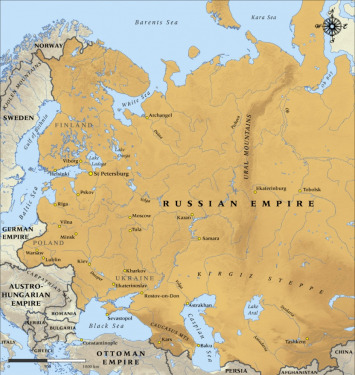
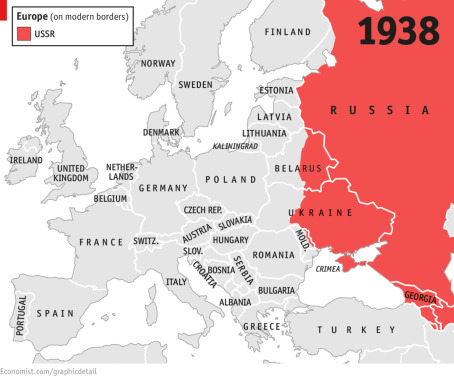
#ussr#stalin#communism#soviet union#the ussr was tsarism with a Politburo#it's literally the exact reason why they signed the Treaty of Rapallo#why they did the Fourth Partition of Poland#why all their annexations save Moldova were based on the idea of 'Russian imperialism in Marxist drag'#I again welcome tankies to explain to me what the precise 'revolutionary' logic is in aligning the map neatly with the Romanovs#please by all means#the Romanov frontiers are no more 'natural' than those of any other state#so why specifically align 'revolutionary' Russia with the guys who thought they were literal sacred monarchs?
5 notes
·
View notes
Text
Just leaving this here.
The world needs to listen to and help the Assyrian people.
They need our help.
We can’t keep ignoring them. To do so is to condemn them.
Reblog this
#personal stuff#dougie rambles#political crap#treaty of Lausanne#centenary#assyria#assyrian people#assyrian history#assyrians#self determination#or lack thereof#indigenous politics#syriac#European Syriac union#dawronoye#leftism#signal boost#reblog this#assyrian
2 notes
·
View notes
Link
Putin is trying to restore the decrepit Soviet empire of his youth. He doesn’t care how many Ukrainians or Russians have to die for his delusional fantasy.
In the article (archived) at the Journal of Democracy, Renée de Nevers and Brian D. Taylor view the invasion, now almost 14 months old, as an attempt at recolonialization by Putin’s Russia.
[C]alls for Ukraine to cede territory in exchange for peace follow the maxim of the ancient Greek historian Thucydides: “The strong do what they can and the weak suffer what they must.” Given the size of Russia’s population and economy, not to mention its nuclear arsenal, the reasoning goes, Ukraine has no choice but to yield territory. It may be unfair, according to these international relations “realists,” but that’s just how the world works.
Yet this is not how the world today works. Russia’s aggression—a naked attempt to recolonize Ukraine—is a violation of the norm of territorial integrity and a throwback to the age of imperialism. It’s a jarring anomaly, and possibly unique, in the post–World War II era. Putin announced in September 2022 that Russia had annexed four more Ukrainian provinces—Luhansk, Donetsk, Kherson, and Zaporizhzhia. As NATO secretary-general Jens Stoltenberg pointed out at the time, this was “the largest attempted annexation of European territory by force since the Second World War.”
Stoltenberg is right. The Ukrainian territory that Russia has forcibly seized and declared Russian territory since 2014, including Crimea, encompasses more than 135,000 square kilometers—that is larger than Austria and Switzerland combined.
This is not a simple territorial dispute as Ron “Pudding Fingers” DeSantis called it. And border disputes are settled by arbitration, negotiations, and treaties like the Webster-Ashburton Treaty – not by one side starting a genocidal war against the other side. This is a blatant land grab whose basic aim is to eliminate Ukraine as a national entity. Putin wants Ukraine back as a Russian colony and most Ukrainians strongly oppose this.
The story of the Russia-Ukraine War is different. It is, in essence, a war of recolonization by the former imperial power. Further, and a critical and consequential feature of this case, Ukraine is a full-fledged member of the UN whose 1991 borders were explicitly affirmed by Russia on no fewer than four occasions before 2014: the Alma Ata Declaration (1991), the Budapest Memorandum (1994), the Treaty on Friendship, Cooperation, and Partnership between Russia and Ukraine (1997), and the Treaty Between Russia and Ukraine on the State Border (2003). This last treaty was signed personally by Vladimir Putin. As recently as 2008, Putin said, “Russia has long recognized the borders of modern-day Ukraine,” and “Crimea is not a disputed territory.”
Russia’s invasion is in violation of numerous treaties. Yet, brainless tankies and pro-authoritarians in the West insist on immediate negotiations. Presumably such negotiations would result in a treaty which Russia would soon violate just like the ones it is violating now. We’ve seen this film before, in the 1930s.
The international community would set a terrible precedent if it pressured Ukraine to give up multiple provinces—lands on which Russian forces have committed genocidal acts, including taking thousands of Ukrainian children and sending them to Russia. The return to business-as-usual with Russia after the 2014 annexation of Crimea emboldened rather than deterred Putin’s larger territorial ambitions. Ukraine is right to insist that the norm of territorial integrity be upheld. We should not accept that forcible territorial conquest is legitimate in the twenty-first century. It is, in fact, extremely rare and viewed with opprobrium by most of the world’s states. After Putin declared Russia’s incorporation of the four Ukrainian provinces in September 2022, the UN General Assembly denounced the move by a vote of 143 to 5, with 35 abstentions.
Borders, of course, are made by humans and thus imperfect. But respect for existing borders is central to the UN-led international system of sovereign states. On the eve of Russia’s invasion in February 2022, the Kenyan ambassador to the UN, Martin Kimani, noted that after independence Africans chose to “settle for the borders that we inherited” rather than descend into decades of war, and that they “rejected irredentism and expansionism on any basis.”
Africa may have its share of problems. But one problem it does not have is countries going to war with each other over old colonial borders. Putin’s war of aggression is a regression to the archaic era of imperialist colonialism.
Imprisoned Russian opposition leader Alexei Navalny recently made a similar point. He stated that Ukraine’s 1991 borders were recognized by Russia at the time and should be recognized by Russia now. “Nearly all the borders in the world are accidental and cause someone’s discontent,” he declared. “But we cannot fight to change them in the twenty-first century. Otherwise, the world will plunge into chaos.”
Kimani and Navalny are right. And the “realists” who want to pressure Ukraine to trade territory for peace are wrong to believe that doing so would work. If Ukraine capitulated, Putin would simply pocket his gains and seek to further subjugate the country in the future. Moreover, by backing such a “resolution” the West would become complicit in undermining the UN system of sovereign states and respect for territorial integrity. Finally, if a powerful state is simply allowed to change its mind about existing borders and treaties, invade and bomb its neighbors, and seize territory by force, what’s to stop others from doing so in the future? Do we really want to turn back the clock to the age of conquest?
In the short run, it’s always easier to do nothing or to let bullies have their way. But that inevitably leads to more and even worse problems. The 1938 Munich agreement tossed Czechoslovakia to Hitler and shut him up for a few short months, it also made World War II more likely the following year.
A victory for Ukraine would end Russia’s attempts to recolonize its former empire. There won’t be a secure peace in Europe until Russia learns how to act like a normal country.
#invasion of ukraine#russia#vladimir putin#imperialism#recolonization#land grab#treaties broken by russia#the former soviet union#tankies#russia's violation of treaties#ukraine#владимир путин#россия#путин хуйло#бывший ссср#реколонизация#империализм#геноцид#путлер#военные преступления#агрессивная война#союз постсоветских клептократических ватников#путин – это лжедмитрий iv а не пётр великий#руки прочь от украины!#геть з україни#вторгнення оркостану в україну#україна переможе#слава україні!#героям слава!
2 notes
·
View notes
Text
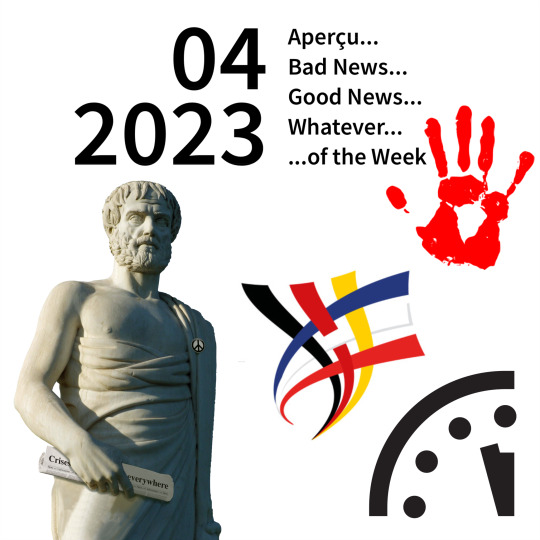
2023 / 04
Aperçu of the Week:
“The person who says it cannot be done, should not interrupt the person doing it.”
(Chinese proverb)
Bad News of the Week:
Two of the most serious terrorist attacks in Europe in recent times happened in France. On November 13, 2015, 130 people died in Paris, and on July 14, 2016, 86 died in Nice. In the first case, the perpetrators were about a dozen terrorists heavily armed with automatic rifles and well prepared. In the second case, a single man with a truck. What I'm getting at is that it's not just the U.S. stereotype of easy access to firearms that is dangerous to the population. With the appropriate criminal or extremist energy, even a vehicle can become a deadly weapon. Or a knife, as everyone has in their kitchen.
That's exactly what happened in Europe this week. Twice. In northern Germany near Hamburg, two young people were killed Wednesday on a regional train, and five others were injured. In southern Spain on Thursday, one was killed and three injured in front of a church. What makes the whole thing more horrific than the comparatively low number of victims are two backgrounds that are virtually identical for both perpetrators - of course they were men.
Both have a migration background, originating from Palestine and Morocco respectively. Neither of them succeeded in integrating into society, and a variety of difficulties are on record. And both were under police surveillance. The terrorist in Germany had been released from prison only six days earlier; his record in this country includes numerous violent crimes; nothing is known about him before that. The offender in Spain is said to be increasingly radicalized; his deportation proceedings have been underway for six months. This is grist to the mill of all those who take to the streets and shout cheap slogans against migration. After all, both acts seem to prove their pseudo-arguments right.
Hardly anyone in this world should have as much experience with "collective guilt" as we Germans. And this is exactly what people from the Middle East know here as well as those from the Maghreb in Spain. If in any public bus in Europe there is a seat free next to a visibly "not from here" passenger and one next to a compatriot, statistically 95% will sit next to the latter, even if the seat is further away. And most of them would describe themselves as tolerant and open-minded and reject prejudice with honest indignation. The nasty term "latent racism" is unpopular but widely spread.
And that is precisely the point about migration. This can only be successful if both sides work at it. Integration is a debt to be discharged by those who, for whatever reason, are looking for a new home. And likewise for the environment that takes him in. It has to accept them, because without migration nothing would work anymore. Anyone who doubts this should take a look at those who work, for example, in garbage collection, cleaning crews or nursing services. These are precisely the jobs that are never on the list when children are asked what they want to exercise as profession as adults.
Successful integration is therefore a win-win situation. And it is especially important for the survival of an aging society. I wish so much for more curiosity than reservations. Tea and coffee, apples and cherries, jazz and tango, pepper and parsley, cotton and silk, potatoes and rice, pizza and kebab would all be unknown to us if we were not open to new and foreign things.
Good News of the Week:
60 years of the Élysée Treaty. Even if the Franco-German engine sometimes sputters a little, it still runs quite well. Or as Economy Minister Bruno Le Maire says: "It's running very well. Contrary to what I hear here and there, the engine is working!" Or to stay with the metaphor, Renault and Volkswagen's platform strategy is a functional basis for the European mobility project.
At the celebrations of the 60th anniversary of the Elysée Treaty in Paris, French President Emmanuel Macron called on Germany to become "pioneers of the refoundation of our Europe" together with France. This role belongs to the two neighboring states, he said, because they walked the path of reconciliation together after World War II. Charles de Gaulle and Konrad Adenauer, François Mitterand and Helmut Kohl, Jacques Chirac and Angela Merkel - without the hand of the two largest countries on the European continent, there would be neither the European Union nor the Euro.
This must never be forgotten in the minutiae of everyday political life: Europe can only do well if the Franco-German partnership does well. Especially when the British have decided - once again - to take their island status literally. This is an appeal that I would particularly like to make to Olaf Scholz. Because Emmanuel Macron has long since understood what his German counterpart is still struggling with: positioning himself between U.S. expectations and Russian detachment as the only thing that objectively makes sense. Namely, to lead Europe together.
It fits into the picture that Henri will be joining us next week. A French exchange student from near Paris. This reminds me of the background of my own youthful experience abroad. It even lasted a year, took me to French Canada three and a half decades ago, and still shapes me today. The organization was and is called the American Field Service. A charity that cared for the wounded on the battlefield in both world wars - whether friend or foe. Then they had the idea, as simple as it was brilliant, that it would be easier for everyone involved if there were no wars at all.
How to do that? By promoting intercultural understanding. Those who know and understand other peoples will probably think twice before they want to fight them. Works. Really. "It's not better or worse. It's just different." was our motto back then. Or just in French, "Ce n'est pas mieux ou pire. C'est juste different." If you look benevolently at the other, you will always find more things that unite you than divide you. If the former hereditary enemies France and Germany can manage that, nothing is impossible.
Personal happy moment of the week:
Okay, I'll try: I figured out why our clothes dryer stopped working properly. My daughter narrowly avoided a more serious accident with her bike on the slick road the day before yesterday. Defrosting the freezer succeeded without flooding. My son's last five grades at school are A's four times and a B once. At work, I finally finished a pesky major project... I suspect that I need to eat more chocolate, that one of these aspects will manage to make me truly happy.
I couldn't care less...
...that Foreign Minister Annalena Baerbock is facing opposition to her idea of a tribunal under Ukrainian law with international judges. After all, she is the highest-ranking politician who is thinking aloud about how Vladimir Putin could also be held criminally accountable for his war of aggression, which violates international law. What else would remain? There is the International Criminal Court in The Hague, Netherlands, but that court, by statute, can only hear cases in which the plaintiff and defendant are members of the court or a case is referred by the United Nations Security Council. Russia is not part of the Court and, as a permanent member with veto power in the UN Security Council, can and will block a referral to the Court. Alternatively, we can only hope for biology: Putin is 70 years old. The life expectancy of Russian men is currently 68.
As I write this...
...I already have a suggestion for the misname of the year: "Panzerwende". Meaning "tank turnaround". Meaning the western allies, who after long hesitation now want to deliver so-called battle tanks to Ukraine. I don't see a turnaround. Just another step on the way to give an innocent country the equipment it needs to defend itself more effectively against the aggressor.
Post Scriptum
This year, the Science and Security Board of the Bulletin of the Atomic Scientists moves the "Doomsday Clock" forward. The Clock now stands at 90 seconds to midnight - the closest to global catastrophe it has ever been. Mainly though not exclusively because of the rising dangers of the war over Ukraine. Since the scientists base their assessment not only on the nuclear issue, but also on other negative factors mankind is confronted with. So the omnipresent polycrisis. The clock is ticking.
#thoughts#aperçu#good news#bad news#news of the week#happy moments#politics#chinese proverb#terrorists#weapons#europe#prejudice#racism#migration#integration#elysee#Treaty#france#germany#european union#Euro#chocolate#annalena baerbock#vladimir putin#criminal#battle tank#doomsday clock#ukraine#russia#win win
4 notes
·
View notes
Text
Very disappointing about the UK Supreme Court ruling but it may actually help the cause for Scottish Independence as it shows we are not in fact a union of equals.
I imagine it'll be down to using the next general election as a defacto referendum and going to the UN about Westminster not honouring an international treaty and right to self determination.
64 notes
·
View notes
Text
European Parliament committees voted for EU withdrawal from Energy Charter Treaty
Parliament’s trade and energy committees voted for the EU’s withdrawal from the Energy Charter Treaty (ECT) on Tuesday, with 58 MEPs in favour, eight against, and two abstaining, according to Euractiv.
The ECT is an international treaty signed by 50 countries to promote co-operation between states on energy issues and to attract and protect investment in energy enterprises in post-Soviet countries.
The trade committee’s rapporteur on the file, Anna Cavazzini, hailed the vote as “a major step in the right direction” and welcomed the EU’s expected withdrawal from the “climate-hostile” ECT.
The Parliament’s vote followed the European Commission’s proposal for a coordinated EU withdrawal from the treaty, tabled last month after several EU countries simultaneously withdrew from the Energy Charter Treaty or announced their intention to withdraw from the ECT. Lead energy committee MEP Marc Botenga stated:
The Energy Charter Treaty allows fossil fuel multinationals to sue states and the EU if climate policies affect their profits. In the midst of a climate crisis, this is a contradiction, in addition to being very costly for taxpayers.
Read more HERE

#world news#world politics#news#europe#european news#eu politics#european union#eu news#european parliament#energy charter treaty#energy#energy efficiency#energy update#ECT
0 notes
Text

One man ALMOST killed all humanity.
#archduke franz ferdinand#Of Austria#ww1#ww2#austrian painter#mussolini#treaty of versailles#cold war#space race#soviet union#USA#america#Global destruction#im an idiot#Humans kill eachother every single moment#world history#One man almost killed every single one if us#You are so insignificant#WORLD WARS
1 note
·
View note
Text
XXX3 December 1
xxx3 December 1
December is a month of wonder, joy, and celebration. It is a time when the chill in the air and the falling snowflakes create a winter’s dream, reminding us to slow down and savor the simple moments of life. The holiday season fills our hearts with love, peace, and goodwill towards all. December is a time for reflection, where we look back on the year gone by and celebrate the…

View On WordPress
#41st President#Antarctic Treaty#Australia#civil rights movement#December 1#Denmark#draft lottery#George H.W. Bush#Iceland#Independence#military activity#Montgomery Bus Boycott#Papua New Guinea#Rosa Parks#Soviet Union#territorial claims#Ukrainian independence referendum#United States.#Vietnam War
1 note
·
View note
Text
IPU's work to support parliaments on climate change.
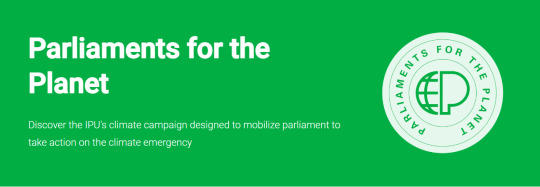
Climate change is killing people and destroying lives, development, peace and security all over the world. That's why climate action has been recognized as the top policy priority for the IPU.
The ultimate goal of the IPU’s action on climate change is to allow all people to live on a healthier planet with warming limited to 1.5 degrees Celsius above pre-industrial levels.
The IPU helps parliaments make progress on the Paris Agreement as well as other climate treaties, accelerate decarbonization and reduce the carbon footprint within parliaments themselves through its research, tools and meetings.
All year, the IPU organizes events for parliamentarians to come together and exchange good practice when it comes to legislating, budgeting or scrutinizing government action on climate change.
The IPU works closely with UN partners on climate change, especially the United Nations Climate Change Conference held in the framework of the United Nations Framework Convention on Climate Change.
The IPU also endeavours to reduce its own carbon footprint, including its Assemblies.
Discover the IPU's work on climate change including its events, case studies, toolkits for parliamentarians and good examples of legislation.
#Paris Agreement#30 june#inter-parliamentary union#Climate change#United Nations Framework Convention on Climate Change#climate treaties#parliamentarians#climate action#decarbonization#climate footprint
0 notes